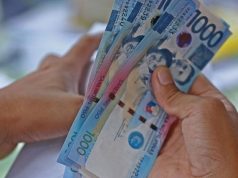MANILA, Philippines – A nominal cut in the personal income tax but, in exchange, a bevy of tax increases on a number of goods and services.
Basically in the words of a Deputy Speaker Romero Federico Quimbo, with a pinch of salt: “What the left hand giveth, the right hand taketh away.”
This, in essence, characterizes the Comprehensive Tax Reform Program (CTRP), which legislators and the Executive department hoped to “as much as possible” provide “equitable relief to a greater number of taxpayers” through a reduction of the income tax rate.
The Department of Finance (DOF) said the package could benefit as many as 4.7 million wage earners.
Proposed as separate bills in the past congresses and the incumbent 17th Congress, a measure lowering the personal income tax was incorporated into this comprehensive tax package, which includes imposing excise taxes and lifting the VAT (value added tax) exemptions on certain goods and services.
‘Anti-poor’
Representative Carlos Zarate said the bill was “anti-poor.”
The bloc to which he belongs, the Bayan Muna Partylist, mounted on Saturday a picket in front of the House of Representatives to jumpstart the group’s series of protest actions against the “anti-poor tax reform package of the finance department.”
“This tax reform measure is giving more incentives to the rich, and burdening even more the ordinary consumers and the poor who will bear the brunt of the downstream impact of the proposed new taxes,” he said.
He described CTRP as “deceptive” because, while it does give some workers extra take-home pay, they would ultimately have to shell out more money when the prices of oil, LPG, canned goods and other items spike up as the new excise taxes kick in.
Offsetting foregone revenue
According to the Department of Finance (DOF), reforms in the personal income tax (PIT) regime would lead to revenue attrition estimated at P63 billion in the second half of 2017; P138 billion in 2018 and P152 billion in 2019.
“In the absence of the corresponding tax reform measures that would offset the projected foregone revenues from the PIT reductions, the country’s poorest families would end up as the ultimate losers, given that the continued scarcity of public funds would further constrain government spending on education, health care, and social protection to help lift the bottom 50 percent of the population from poverty,” DOF Undersecretary Karl Kendrick Chua explained, in defending the measure.
ACT Teachers partylist Representative Antonio Tinio, a member of the ways and means committee at the House of Representatives, pointed out that, with CTRP, the government would actually end up with more collections, from the new taxes and lifting of VAT exemptions: P120 billion from excise tax on oil; P90 billion from the expanded Value Added Tax coverage; and, tax on the purchase of new vehicles (around P40 billion).
“This is not just about recouping the revenue loss (from lower income tax), the objective is to generate more money to fund the government infrastructure projects,” Tinio said.
To give an idea on the effect of the proposed tax package on the ordinary Filipinos, InterAksyon.com asked the DOF to give sample computations of the effect of the new personal income tax regime, and the impact of the new taxes on several items and services.
It also asked Bayan Muna for a similar take.
Entry-level workers whose annual income does not exceed P250,000 do not have to pay an income tax under the current law.











